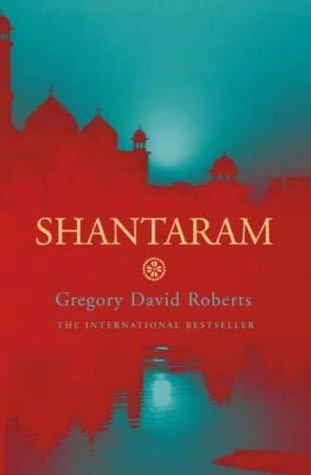Shantaram! If I were to summarize the book in one word, it would be spectacular or rather unbelievable! There wouldn't be or rather shouldn't be many who like to read and still haven't heard of this masterpiece! It is a scintillating account, part-fact part-fiction of the life of the author Gregory David Roberts and his life in Mumbai, the then Bombay (1980s).
From the moment, the narrator as I would prefer to call him, lands in Bombay to the last page, he brings to life every nook and corner of the city, lifting the curtain that exists between us and the people we see on the street. I couldn't help but notice, how he gives life to the hundreds of people we see on the street, but never bother to think that even they could have a story to tell. He tells the stories of these unknown faces, and with what elan! But this book remains the narrator's story, how he falls in love with everything about the city - the maddening crowd, the taxis, the slums, the mafia, the women. But more importantly how he reclaims himself from his past.
Very few books claim to be thriller and philosophy at the same time, it is one of them. The book takes you to the dark lanes of Bombay, you never knew existed. It talks about everything you already know about Bombay - the mafia, the bollywood, the slums, the muggy weather, the Hajji Ali, the Fort area and above all Leopold's. But then it never stops there. All these come alive and play out their role in the narrative and its a piece of art how they intertwine with each other to give Bombay the flavor it has. Alas, the Thackareys perhaps would never be able to understand what Bombay stands for, not just to the marathi manoos, but to the rest of India as well.
The characters are neatly drawn with most of them having a mysterious streak about them. From the sharp, quick witted Karla to the enigma of mafia don Khader, to the youthful Abdullah, to the sarcastic Didier. The biggest exception is the affable taxi driver and the best friend of the narrator, Prabhaker. It is his simplicity and innocent intelligence that that takes you by the arm and makes you turn page by page. Another of my favorite character was Karla, of course. Most of her lines can easily pass as punchlines and philosophies dipped in sarcasm and brutal honesty. And when she says that being listened to is one the best and dangerous thing in world, I couldn't agree more!
But in the end, the book is about love. Love in all its shapes and forms, for a friend, for a beloved, for a father, for a brother. Unrequited love and the longing, the pain and suffering that it brings. Its about realization of oneself. Its about learning to live on one's conditions and to love unconditionally. If this is what is spirituality, then indeed Shantaram opens the gates to it. The words remain with you long after you have closed the book. Many times in fact you would close the book yourself to grasp what Didier says, what Karla mumbles or what Shantaram realizes throughout the course of the book.
It is indeed one of the best books I have ever read. It creates a different world around you and weaves its magic that bedazzles you and engulfs you. I hope Mira Nair would indeed make the movie with Johny Depp as THE Shantaram Big B as Khader. This story needs to be told. The only grudge I had with this book was its length, it could easily be shorter by about a 100 pages.
The book indeed made me wonder how a foreigner could understand India so well. In fact, at so many times I felt he knew more about us than what we know. He talks about everything good or bad, never being judgemental, or cynical. And when you finally close the book, what remains with you are the author's words and you wonder how true they sound... Sometimes in India, you need to surrender first before you win.







